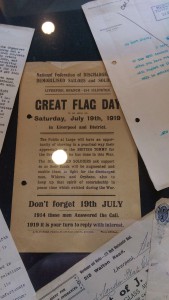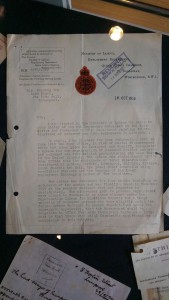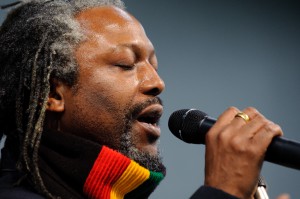
I recently had the privilege of attending the launch of From Great War to Race Riots, an exciting project from the Liverpool community organisation, Writing on the Wall.The group has been given access to a collection of fascinating documents that relate to the experiences of Black ex-servicemen, seamen and factory workers in Liverpool just after the First World War. With financial support from the Heritage Lottery Fund, Writing on the Wall have begun a project to explore, preserve and archive this valuable collection of historical material and find creative ways to share the information that it contains.
While many people are understandably concerned with remembering the events of the war, the immediate aftermath of the conflict was, in many ways, just as interesting. In Liverpool, as elsewhere, many of the returning service personnel found it difficult to adjust to the demands of peacetime and the changed realities of postwar Britain.
The documents in this collection tell of the particular difficulties of families from the West Indies and the Caribbean, many of whom were in Liverpool as merchant seamen or as volunteer soldiers but who found themselves the target of racial abuse and even an organised boycott by white workers who felt that their jobs were threatened by the presence of Black workers. These tensions flared into violence, including rioting and, on the 5th June 1919, of the killing of 24 year-old Charles Wootton, a ships fireman from Bermuda. Wootton, who was chased by a crowd to the Queens Dock, where he either jumped or was thrown into the water, was hit on the head by a stone and drowned.
Charles Wootton’s tragic story is reasonably well known. What the collection of documents offers is the chance to uncover more lives and expose some of the hidden histories of this chapter in the Liverpool story. Among the documents are a list of names and addresses of men who served in the merchant marine, several letters from the Lord Mayor and an advertisement for a ‘Great Flag Day’ to raise fund for discharged soldiers.

Writing on the Wall are working with writer Emy Onuora, historian Mike Boyle and poet Levi Tafari to explore and respond to the archive. They are appealing for volunteers to get involved and to help investigate this treasure trove of hidden history.
Participants will have the opportunity to:
- Explore Black settlement in Liverpool and the UK from the early establishment of that community in the late 1800’s and early 1900’s, and will gain an understanding of how the Liverpool community differed in its development as compared to other UK cities while being able to identify similarities across the Black British experience.
- Conduct historical research and have the opportunity to research members of their own community and families.
- Develop skills, in cataloguing, digitisation, preservation and curation, in relation to historic documentary archives, receive training and advice from a range of professionals including staff within the Liverpool Records Office and National Museums Liverpool.
- Develop web based skills through the scanning, cataloguing and digitisation of the archive on a dedicated website.
- Respond creatively to the archive guided and supported by renowned poet Levi Tafari from the huge interest generated by the George Garrett Archive, the Library management have indicated their willingness to house exhibitions and host activities to raise awareness of this new archives presence.
For more information, or to get involved, please visit Writing on the Wall’s website.

Levi Tafari offered readings of some of his poems at the launch event. He has very kindly provided copies of them which you can read below:
A LETTER OF CONCERN
THE TOWN HALL
LIVERPOOL
13 MAY 1919
Dear Home Secretary in Parliament London
I am writing this letter to you
I have had a visit from the Ethiopian Association
I need your advice on what to do
Six hundred African British subjects
are stranded here in the city of Liverpool
they are anxious to return home to Africa
as their treatment in the city by the locals is tantamount to cruel
Though many of them have served in our armed forces
they have strange practices not to mention their culture
many have married British women and have children
some say the races should not mix they find this practice vulgar
Speaking for myself I would just like to say
this is not the way I think
but if this situation is not resolved soon
our city will soon be on the brink
Companies won’t employ coloured men
as employers and the trade unions conspire
to up hold segregation in the work place
integration is not what they desire
I am caught in the middle which way should I turn
I say pay them five pounds and then repatriate them
it’s a small sum to pay for their return
to relieve us of this Black irritation problem
Can you give my concern your urgent attention
I beg your haste in dealing with this matter
these coloured men bring out the worst in our men
these black men are destroying our culture.
I AM SIR
YOUR OBEDIENT SERVANT
JOHN RICHIE
LORD MAYOR
P.S. Our city would once again be light, bright and all right!
And did I mention all white.
© Levi Tafari
May 2014
THE WAR CONTINUES
After the metal curtains of war were fully drawn
the fabric of the landscape was distorted and torn
like ants the troops retreated from the burning embers
but justice and liberty did not await black soldiers
Now back in Liverpool they had to fight to survive
they had fought for king and country and were still alive
returning to the loved ones they had left behind
there was no hero’s welcome love was hard to find
They thought the war was over but they faced a whole new plight
the racism in Liverpool was so severe they became prisoners at night
now deemed as social lepers they had very little support
they were treated like slaves who were sold and bought
The murder of Charles Wooton 1919 turned the city to one of flames
as the powers that be hid their faces with a cloak of shame
the church and the state didn’t have a clue to a solution
a mindset of prejudice added fuel to the devastation
The Lord Mayor stepped forward with an acute suggestion
the answer is simple and clear the answer is repatriation
I think to myself it seems peculiar yes very strange
in the grand scheme of things very little has changed
Immigration is still an issue as it was then back in the day
not all black soldiers who fought for Britain has the right of stay
many have lobbied parliament but their efforts were in vain
as some of them have been repatriated back to from where they came
If you go to battle for Britain and your skin is black
make sure you know who’s the real enemy is before you attack
when you settle back into your civvy you will still face flack
by the same flag you were defending Britain’s Union Jack
© Levi Tafari
FIGHTING FOR PEACE
Like a baby Liverpool struggled
to stand on her own two feet
the great war was over supplies were spars
and there was rationing on food to eat
The fog and the smog were unwelcomed guest
that added to the doom and gloom
austerity and depression occupied Upper Pit Street
so Parliament Street is where black people found room
Leaving behind their place of birth to reside in the motherland
seeking to find a better life so they ventured to England
to make a contribution that’s what these black men had in mind
but equality and justice these black men could not find
Duke Street was removed from the poverty
that dwelt on Mill Street in Liverpool Eight
Princes Avenue, Newton and Beauford Street
where places were black and white would copulate
Black servicemen fought on the battle ground
a fearless heart pounding in their chest
discrimination, segregation, misconception
divorced the black population from the rest
It was out of the frying pan into the fire
the battle was now on Liverpool’s streets
Liverpool was hostile in fact very vile
and the black man had to retreat
Pleading to the Lord Mayor got them nowhere
as their cries fell on deaf ears
the Lord Mayor made a radical decision yes discrimination
to alleviate his citizens fears
When the locals made outrageous claims shouting racist names
tensions exploded as the battles increased
Black men had fought in the great war and didn’t want to fight no more
but were ready and prepared to fight for PEACE
© Levi Tafari
May 2014